九年级全册 Units 3-4-【精品课】备战2024年中考英语一轮复习教材梳理课件(人教版)
文档属性
| 名称 | 九年级全册 Units 3-4-【精品课】备战2024年中考英语一轮复习教材梳理课件(人教版) |
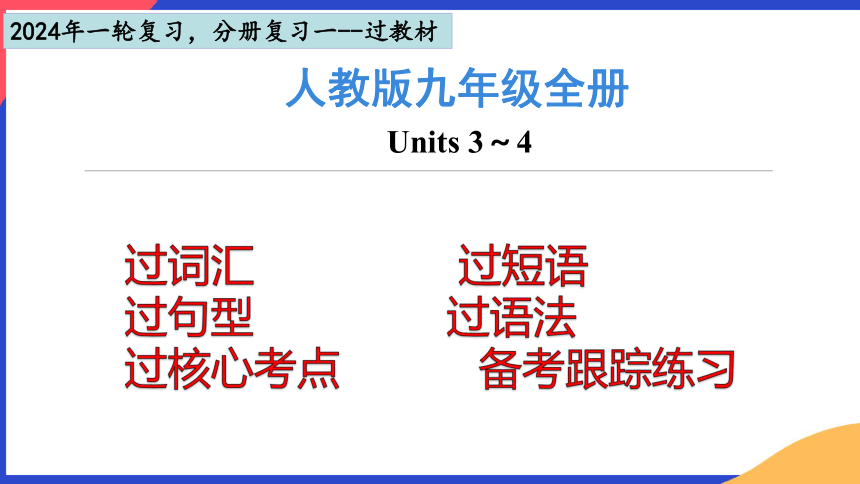
|
|
| 格式 | pptx | ||
| 文件大小 | 1.1MB | ||
| 资源类型 | 试卷 | ||
| 版本资源 | 人教新目标(Go for it)版 | ||
| 科目 | 英语 | ||
| 更新时间 | 2024-03-05 00:00:00 | ||
图片预览

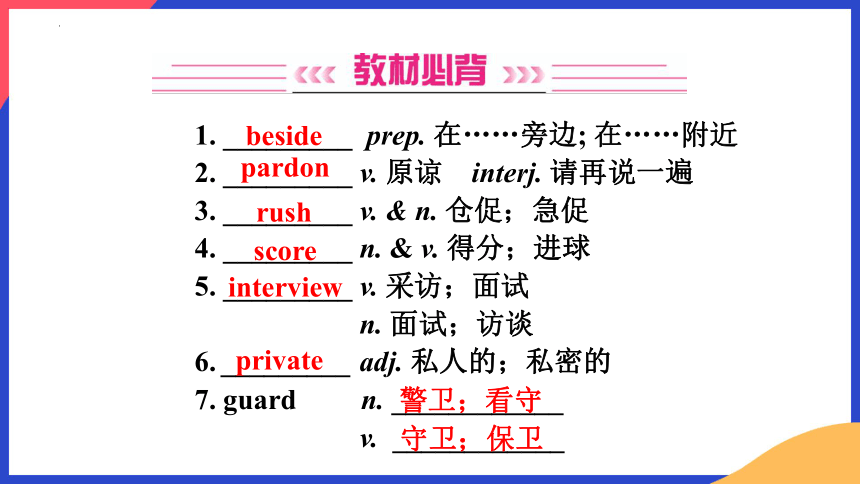

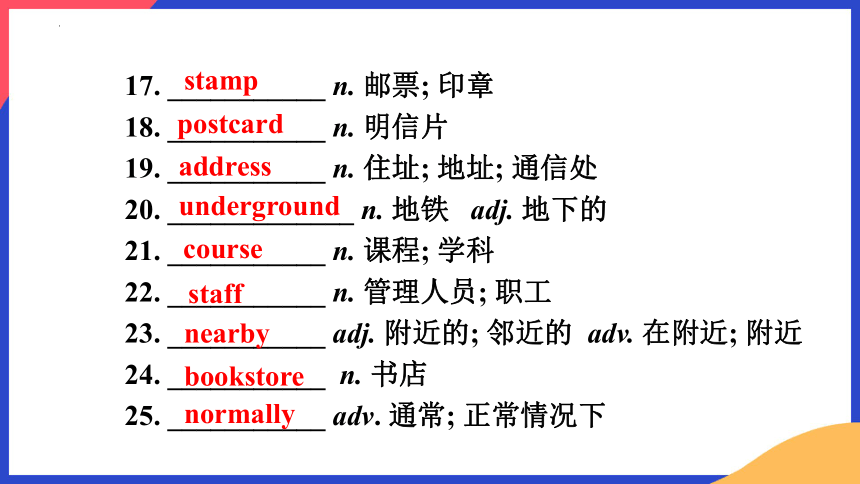
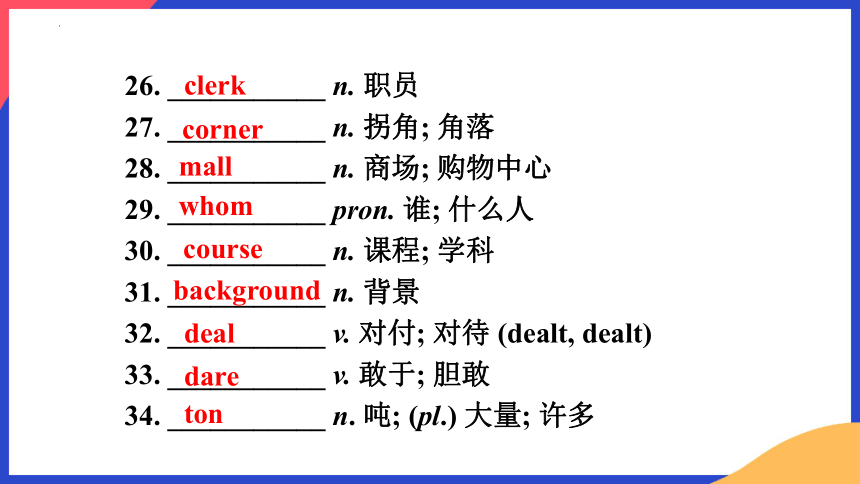
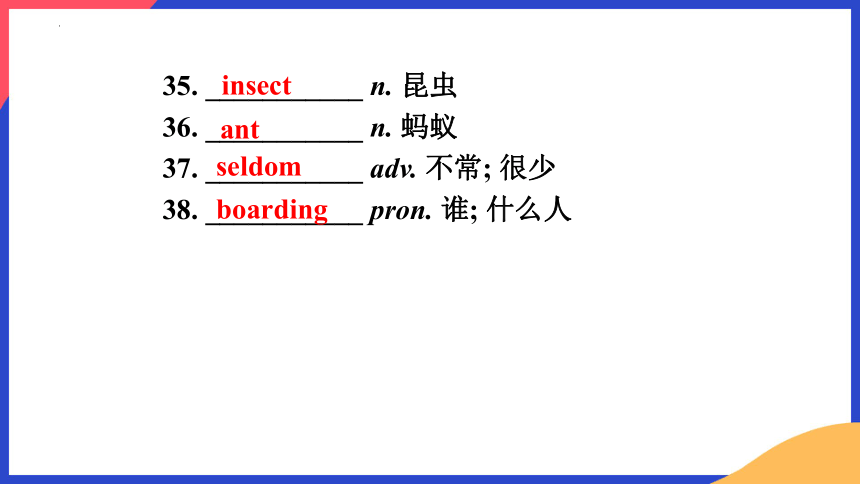
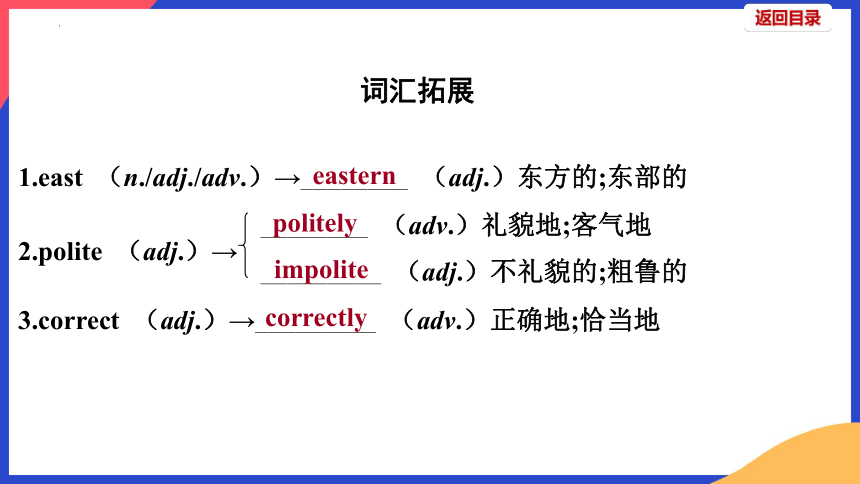
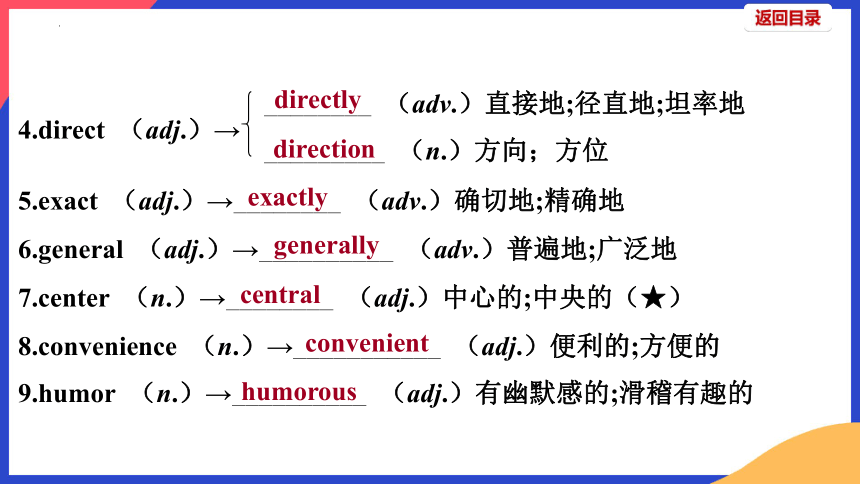
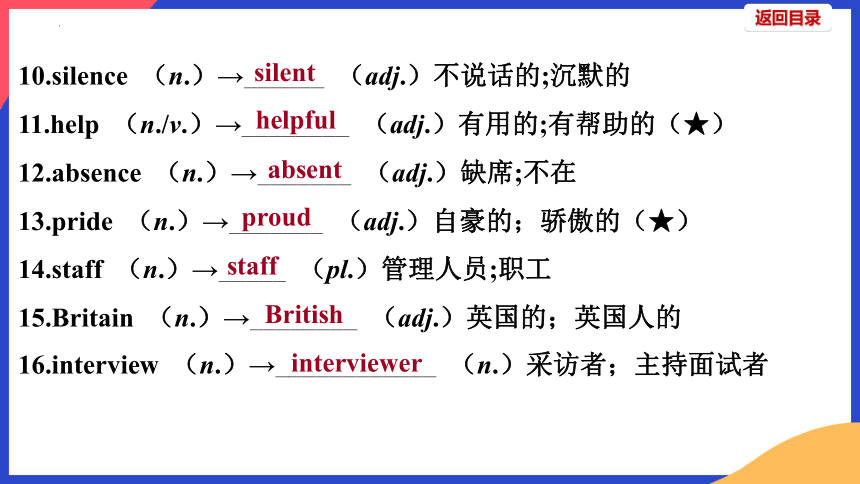
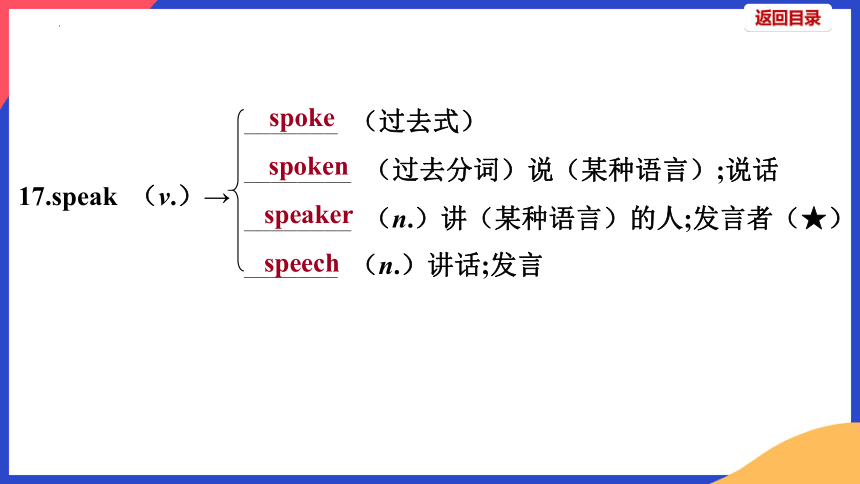
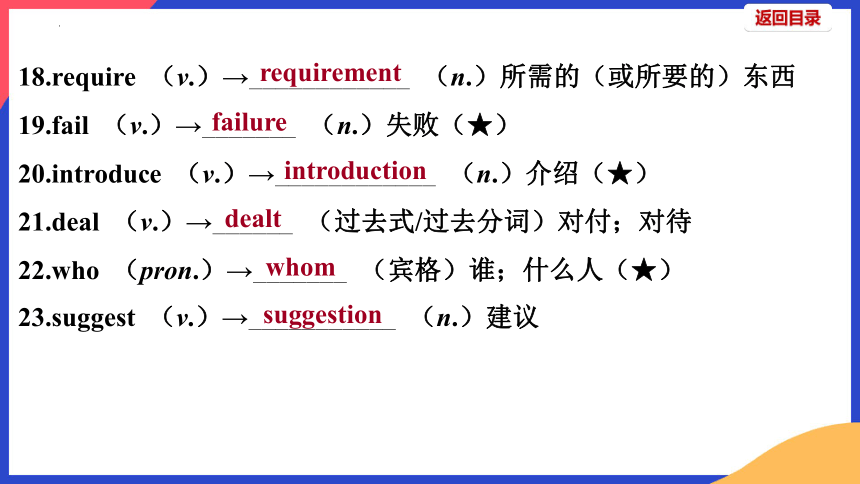
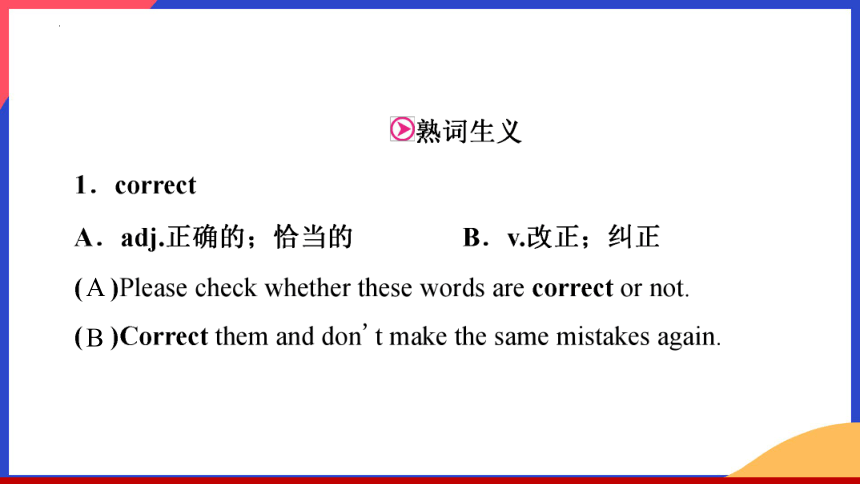
文档简介
(共81张PPT)
Units 3~4
过词汇 过短语
过句型 过语法 过核心考点 备考跟踪练习
2024年一轮复习,分册复习一--过教材
人教版九年级全册
1. _________ prep. 在……旁边; 在……附近
2. _________ v. 原谅 interj. 请再说一遍
3. _________ v. & n. 仓促;急促
4. _________ n. & v. 得分;进球
5. _________ v. 采访;面试
n. 面试;访谈
6. _________ adj. 私人的;私密的
7. guard n. ____________
v. ____________
beside
pardon
rush
interview
score
警卫;看守
private
守卫;保卫
8. ___________ adj. 迷人的;极有吸引力的
9. ___________ v. 需要;要求
10. __________ adj. 方便的;便利的
11. __________ n. & v. 要求;请求
12. __________ adj. 正确的;恰当的
13. __________ adj. 英国(人)的
14. __________ n. 方向; 方位
15. public n. ____________
adj. _______________
16. __________ v. & n. 影响
fascinating
convenient
request
correct
require
British
direction
民众
公开的; 公众的
influence
17. ___________ n. 邮票; 印章
18. ___________ n. 明信片
19. ___________ n. 住址; 地址; 通信处
20. _____________ n. 地铁 adj. 地下的
21. ___________ n. 课程; 学科
22. ___________ n. 管理人员; 职工
23. ___________ adj. 附近的; 邻近的 adv. 在附近; 附近
24. ___________ n. 书店
25. ___________ adv. 通常; 正常情况下
stamp
address
underground
course
postcard
staff
nearby
bookstore
normally
26. ___________ n. 职员
27. ___________ n. 拐角; 角落
28. ___________ n. 商场; 购物中心
29. ___________ pron. 谁; 什么人
30. ___________ n. 课程; 学科
31. ___________ n. 背景
32. ___________ v. 对付; 对待 (dealt, dealt)
33. ___________ v. 敢于; 胆敢
34. ___________ n. 吨; (pl.) 大量; 许多
clerk
mall
whom
course
corner
background
deal
dare
ton
35. ___________ n. 昆虫
36. ___________ n. 蚂蚁
37. ___________ adv. 不常; 很少
38. ___________ pron. 谁; 什么人
insect
seldom
boarding
ant
词汇拓展
1.east (n./adj./adv.)→________ (adj.)东方的;东部的
eastern
________ (adv.)礼貌地;客气地
_________ (adj.)不礼貌的;粗鲁的
politely
impolite
3.correct (adj.)→_________ (adv.)正确地;恰当地
correctly
2.polite (adj.)→
________ (adv.)直接地;径直地;坦率地
_________ (n.)方向;方位
directly
direction
5.exact (adj.)→________ (adv.)确切地;精确地
6.general (adj.)→__________ (adv.)普遍地;广泛地
7.center (n.)→________ (adj.)中心的;中央的(★)
8.convenience (n.)→___________ (adj.)便利的;方便的
9.humor (n.)→__________ (adj.)有幽默感的;滑稽有趣的
exactly
generally
central
convenient
humorous
4.direct (adj.)→
10.silence (n.)→______ (adj.)不说话的;沉默的
11.help (n./v.)→________ (adj.)有用的;有帮助的(★)
12.absence (n.)→_______ (adj.)缺席;不在
13.pride (n.)→_______ (adj.)自豪的;骄傲的(★)
14.staff (n.)→_____ (pl.)管理人员;职工
15.Britain (n.)→________ (adj.)英国的;英国人的
16.interview (n.)→____________ (n.)采访者;主持面试者
silent
helpful
absent
proud
staff
British
interviewer
_______ (过去式)
________ (过去分词)说(某种语言);说话
________ (n.)讲(某种语言)的人;发言者(★)
_______ (n.)讲话;发言
spoke
spoken
speaker
speech
17.speak (v.)→
18.require (v.)→____________ (n.)所需的(或所要的)东西
19.fail (v.)→_______ (n.)失败(★)
20.introduce (v.)→____________ (n.)介绍(★)
21.deal (v.)→______ (过去式/过去分词)对付;对待
22.who (pron.)→_______ (宾格)谁;什么人(★)
23.suggest (v.)→___________ (n.)建议
requirement
failure
introduction
dealt
whom
suggestion
A
B
C
D
A
B
D
A
C
B
B
A
D
E
B
A
C
B
A
C
核心词汇过关练
一、用括号内所给单词的适当形式填空。
1.Don't give up. You know,_______(fail) is the mother of
success.
2.It's _________(polite) not to say “goodbye” to your teacher
when you leave the classroom.
3.There will be a speech in the hall. The ________(speak) is a
famous scientist.
failure
impolite
speaker
4.After hearing what she said,the boy went out of the room in
_______(silent).
5.Pointing out your mistakes ________(direct) may hurt you,but
it can make you a better person.
6.Tom is popular among his classmates because he is very
__________(humor).
7.I think at the beginning of each book,a brief ____________
(introduce) to it is necessary.
silence
directly
humorous
introduction
8.Suffering from war,poverty and illness,many ________(Africa)
children are in need of food,love and care.
9.The flat(公寓) is in the ________(center) area of the
city─just five minutes from Princes Street.
10.You haven't changed at all─you still look ________(exact)
the same.
African
central
exactly
11.A bicycle is often ________________(convenient) than a car
in towns.
12.One writer in _______(who) I have taken an interest is Lao
She.
more convenient
whom
1. 一个地下停车场 _________________________
2. 一个摇滚乐队 ________________
3. 请求帮助 ________________
4. 少量的 ________________
5. 在那时 ________________
6. 缺席 ________________
7. 课堂上保持沉默 ________________
8. 当心;注意 ________________
9. 对……感到紧张 ________________
10. 为……骄傲;感到自豪 ________________
ask for help
a small number of
at that time
be absent from
be careful about
be nervous about
be proud of
an underground parking lot
a rock band
be silent in class
11. 担心…… ;担忧……
__________________________________
12. 换一些钱 ___________________
13. 加油 ___________________
14. 敢于做某事 ___________________
15. 应对;处理 ___________________
16. 电子邮箱地址 ___________________
17. 感到孤单 ___________________
18. 考试不及格 ___________________
19.奋力坚持下去; 继续战斗 ______________
20. 朝东走 ___________________
change some money
come on
dare to do sth.
deal with
feel lonely
fight on
be worried about ... / worry about ...
e-mail address
fail the examinations
go east
21. 经过书店 ___________________
22. 第一次 ___________________
23. 时常;有时 ___________________
24. 取得好成绩 ___________________
25. 被众人所关注 ___________________
26. 自我介绍 ___________________
27. 演讲 ___________________
28. 和朋友们闲逛 ___________________
29. 与他人更好地交流________________________________________
communicate better with other people/others
get tons of attention
give a self-introduction
give a speech
go past the bookstore
for the first time
from time to time
get good scores
hang out with friends
30. 抓住某人的手 _______________________
31. 急忙;匆匆忙忙地 _______________________
32. 公开地;在众人面前 _______________________
33. 亲身;亲自 _______________________
34. 影响某人的学业 ________________________
35. 加入校篮球队 ___________________________
36. 找工作 _______________________
37. 看起来有趣 _______________________
38. 寄信 _______________________
39. 做决定 _______________________
mail a letter
in public
look interesting
in person
in a rush/hurry
look for jobs
hold one’s hand
influence one’s schoolwork
join the school basketball team
make a decision
40. 成功/出人头地 ________________
41. 搬到城市 ________________
42. 在某人的右边 ________________
43. 足球队的一员 ________________
44. 在第三层 ________________
45. 某人去……的路上 ________________
46. 路过;经过 ________________
47. 抱歉;请再说一遍 ________________
48. 私人时间 ________________
pass by/go past
on the soccer team
on one’s right
pardon me
private time
on the third floor
make it to the top
move to the city
on one’s way to...
49. 需要很多天赋以及努力工作
_________________________________
50. 将某人送到一所寄宿学校 _________________________
51. 提供美食 _____________________
52. 以……开始 _____________________
53. 乘24小时的火车 _____________________
54. 成功之路 _____________________
55. 尝试乘骑项目 _____________________
56. 向某人走去 _____________________
57. 戴眼镜 _____________________
wear glasses
send sb. to a boarding school
serve delicious food
start/begin with ...
take a 24-hour train ride
the road/way to success
try the rides
walk up to sb.
require a lot of talent and hard work
重点句型
1.It might seem ______ _________ ___ _______ ________ than
directly.看起来说得客气要比说得直白更难一点。
2.______ ______ we come back here ____ _______ later?我们为什
么不晚一点再回这里吃饭?
more
difficult
to
speak
politely
Why
don't
for
dinner
3.Candy told me _____ she ______ ___ be really shy and _____
____ singing ___ _____ _____ her shyness.坎迪告诉我她过去很害羞,
于是开始从事唱歌以应对害羞。
that
used
to
took
up
to
deal
with
4.____ ______ three years ______ we last _____ our primary
school classmates.自从我们上次看到我们的小学同学已经过去三年了。
It's
been
since
saw
5.—You ______ ___ ____ short,didn't you?你过去个子不高,是
吗?
—Yes,I did./No,I didn't.是,我是。/不,我不是。
used
to
be
6.____ ______ ___ ________ that he used to have difficulties in
school.很难相信他过去在学校有困难。
It's
hard
to
believe
考点二 I used to be afraid of the dark. 我过去害怕黑暗。
辨析used to do sth. , be used to doing sth. 与be used to do sth.
考点 含义及用法 例句
used to do sth. “过去常常”, 暗指现在已经不存在的动作或状态 My uncle used to go to work on foot. 我叔叔过去常常步行去上班。
be(get/become)used to doingsth. “习惯于做某事” She has been used to living here. 她已经习惯住在这里了。
be used to dosth. “被用于做某事” Wood can be used to make paper. 木头能用来造纸。
【考点抢测】
4.用used to, be used to填空。
① The big box ____________ hold magazines and books.
is used to
② He _________ send e-mails to me, but he doesn’t from this year.
used to
③ My grandpa ____________ going for a walk after dinner.
is used to
5.Dick_____ in America,but he has been __ Chinese food since he moved to China.
A. used to live;used to eating B. is used to live;used to eat
C. is used to live;used to eating D. used to living;used to eat
A
考点三 Candy told me that she used to be really shy and took up singing to deal with her shyness. 坎迪告诉我她过去真的很害羞,她从事歌唱是为了克服害羞。
辨析deal with与do with
考点 含义及用法
deal with “处理;应付”,强调处理的方式、方法,常与how 连用
do with “处理;安置”,强调处理的对象,常与what连用
【考点抢测】
6.许多学生不知道如何应对压力。
Many students don’t know __________________ the pressure.
how to deal with
7.我们不能决定生活中会发生什么,但我们可以决定如何应对它。
We can’t decide what will happen in our life, but we can decide _________________ it.
what to do with
考点四 As she got better,she dared to sing in front of her class,and then for the whole school. 当她变得好一些的时候,她敢在她的同学面前唱歌,然后在整个学校面前(唱歌)。
dare的用法
(1)dare用作实义动词时,意为“敢;敢于”,其后接动词不定式,有人称、数和时态的变化。如:
He does not dare to fight. 他不敢去打架。
(2)dare用作情态动词时,意为“敢;敢于”,后接动词原形。主要用于疑问句、否定句和条件句中,构成疑问句和否定句时,不需要借助助动词。如:
Jane dare not go out at night. 简不敢在晚上出去。
【考点抢测】
8.Linda used to be very shy, and she ____ speak in front of others.
A. didn’t dare B. didn’t dare to C. dare not to D. dared not
B
9.Yang Ning is a brave young man. He dares ____ the mountains alone.
A. climb B. climbing C. climbed D. to climb
D
考点五 You really require a lot of talent and hard work to succeed. 你真的需要很高的天赋和努力工作来取得成就。
require的用法
【考点抢测】
10.—Look!The goldfish is dying.
—What a pity!This kind of goldfish ____ a lot of care and attention.
A. has B. offers C. requires D. receives
C
11.Miss Li requires her students ____ school on time every day.
A. to get to B. to get C. getting to D. get to
A
12.This problem requires ____________________(solve) at once, or the people in this apartment can’t get clean water.
solving/to be solved
13.The driver required that all the passengers _________________(wear) their seat belts.
(should) wear
考点六 I know my parents love me and they’re always proud of me. 我知道我的父母爱我,并且他们总是以我为傲。
辨析proud与pride
考点 含义及用法
proud 形容词,意为“自豪的,骄傲的”:(1)be proud of (doing) sth. 意为“为(做)某事感到自豪/骄傲”;(2)be proud to do sth. 意为“做某事很自豪”。
pride 名词,意为“自豪,骄傲”:(1)the pride of 意为“……的骄傲”;(2)take pride in 意为“为……感到自豪”。
【考点抢测】
15.Lang Ping is a symbol of courage and success, and we ____ her.
A. come from B. stand for C. take pride in D. get ready for
C
16.The PLA Navy (中国人民解放军海军) has been greatly helping keep world peace. As a Chinese,I am ____ it.
A. responsible for B. proud of C. full of D. known for
B
考点 7
1. from time to time 时常;有时
【含time的短语】
at that time 那时候 at a time 每次;一次
at the same time 同时 at the time 那时;在那段时间
all the time 一直; 不断地 in time 及时
for a time 一小段时间;一度;一时
for the first time 首次;初次
once upon a time 从前
【语境应用】选短语填空
at a time, for a time, all the time, at the time, at the same time
1) You can't work ___________ — it does you good to go out and enjoy yourself sometimes.
2) —What were you doing when I called you last night
—I was playing the piano ___________.
3) She ran up the stairs two __________.
4) Helen was laughing and crying ________________.
5) Tony lived in Tianjin __________ and then moved to Beijing.
all the time
at the time
at a time
at the same time
for a time
2. deal with 应对;处理
【拓展】
how ... deal with ...与what ... do with ...表达的意思相同,意为“怎样处理/对付……”。
e.g. How will you deal with so much money
= What will you do with so much money
I don’t know what to do with the problem.
= I don’t know how to deal with the problem.
【语境应用】将下列汉语句子翻译成英语。
1)让我来帮你处理这些问题。
2)莉莉不知道怎么处理这些书。
Let me help you deal with these problems.
Lily doesn’t know how to deal with all these books. / Lily doesn’t know what to do with all these books.
1. Excuse me, could you please tell me how to get to the bookstore
1) Could you please ... 请你……,好吗?
用于有礼貌地请求别人做某事, 语气较委婉, please后面接动词原形。
也可以用Will you please ... 或Would you please ... 来表达这一意思。
2) how to get to the bookstore是“疑问词+动词不定式(短语)”结构,在句中作动词tell的宾语补足语。该句可以转换为含有宾语从句的复合句,即Excuse me, could you please tell me how I can get to the bookstore
【注意】
疑问词引导宾语从句时,当宾语从句中的主语与主句的主语或宾语一致时,可使用“疑问词+动词不定式(短语)”结构对从句进行改写。
2. It’s been three years since we last saw our primary school classmates.
It has been … years since …
自从……起,已经……年了
【语境应用】根据所给词的适当形式填空。
— It’s ten years since we _________ (come) here.
— How time flies! We ___________ (work) in China for so long.
came
have worked
一、关联词
由原来的疑问词what, who, which, when, where, how, why等作为引导宾语从句的关联词,这些词在宾语从句中充当一定的句子成分,都有各自的含义,不能省略。
二、语序
疑问词引导的宾语从句要用陈述句语序。
疑问词引导的宾语从句
三、主从句的时态
主句若是现在时,疑问词引导的宾语从句的时态随句意而确定;
主句若是过去时,疑问词引导的宾语从句的时态也用过去的某种时态(宾语从句表示客观真理除外)。
e.g.
Why will you buy a new house Frank asked me.→
Frank asked me why I would buy a new house.
【温馨提示】
如果疑问词在句中作主语或主语的定语,变为宾语从句时语序不变,但时态应作相应变化。
e.g.
Who can answer the question The teacher asked. →
The teacher asked who could answer the question.
Whose book is on the desk We want to know. →
We want to know whose book is on the desk.
1. —Do you know ________ the Dragon Boat Festival is this year
—Sorry, I don’t know the exact date.
A. how B. why C. when
(2023四川成都中考)
C
2. —Excuse me, could you please tell me ________ I want to go
shopping with you.
—Maybe next Saturday afternoon.
A. when are you going to Luofu Plaza
B. when you went to Luofu Plaza
C. when you are going to Luofu Plaza
(2023四川达州中考)
C
3. —I'm wondering ________ at a low price.
—You can book one through our official APP.
A. how I can buy the air ticket
B. how can I buy the air ticket
C. when I can buy the air ticket
D. when can I buy the air ticket
(2023江苏扬州中考)
A
4. She said that the earth ________ around the sun.
A. traveled B. travels C. travel
(2023黑龙江绥化中考)
5. — Could you tell me ________ get something to eat
— Sure. There’s a restaurant down the street.
A. what I can B. what can I
C. where can I D. where I can
(2023湖北鄂州中考)
B
D
6. — Do you know ______
—Yes, in Hangzhou, a beautiful city in Zhejiang Province.
A. when will the 19th Asian Games be held
B. when the 19th Asian Games will be held
C. where will the 19th Asian Games be held
D. where the 19th Asian Games will be held
(2023云南中考)
D
used to结构
used to 过去常常
1) 表示过去习惯性的动作或存在的状态, 强调与现在的对比, 暗示现在不做了。
2) to为不定式符号, 后跟动词原形。
3) used to只用于一般过去时态, 没有人称和数的变化。
e.g. We used to play the drums together.
Gina used to be a shy girl, but now she’s outgoing.
used to的句式变化
1. 否定句: 主语 + didn’t (did not) use to do sth.
e.g. Mike didn’t use to study hard.
Mike过去不努力学习。
He didn’t use to smoke.
他以前不抽烟。
2. 一般疑问句
Did + 主语 + use + to do…
答语:Yes, sb. did. / No, sb. didn’t.
e.g. —你以前常去博物馆吗?
—是的。/ 不是。(翻译)
—Did you use to go to museums
—Yes, I did. / No, I didn’t.
3. 反意疑问句
肯定式主句, didn’t + 人称代词?
主句(否定句), did + 人称代词?
e.g. Your brother used to have noodles for breakfast, didn’t he
你哥哥过去早餐常吃面条, 不是吗?
She didn’t use to walk to school, did she
她过去不常走路去学校,是吧?
词条 意思及用法 例句
used to do sth. 过去习惯性的动作或存在的状态。 Did he use to wear glasses
use ... to do ... 用……做…… We use this knife to cut fruit.
be/get used to (doing) sth. 习惯于……, to是介词, 后接名词、代词或 v.-ing。 My dad is/gets used to getting up early every day.
be used to do 被用来做……, 被动语态结构。 This knife is used to cut fruit.
根据汉语意思完成英语句子,每空一词。
1. 我以前常常和爸爸去爬山。
I ________ ________ ________ mountains with my father.
2. 我现在都用手机来拍照。
I ________ my mobile phone ________ ________ photos now.
3. 你过去常常打篮球吗?
________ you ________ ________ ________ basketball
4. 我父母习惯了晚饭后去散步了。
My parents _______ _______ _______ _______ a walk after supper.
are used to taking
used to climb
use to take
Did use to play
备考跟踪训练
一、单项选择。
1.(2021,黔东南州)Our government is looking for some ways, including the 3-child policy(政策) to ____ the problem of ageing population(人口老龄化).
A. agree with B. start with C. compare with D. deal with
D
2.—In order to win the battle against COVID-19, many heroes lost their lives. How great they are!
—Yeah. China is quite an unusual country. I take pride ____ my motherland.
A. of B. for C. in D. with
C
3.You needn’t take your wallet while going shopping. It’s ____ to pay on WeChat or Alipay (支付宝).
A. convenient B. helpful C. comfortable
A
4.—Is Su Ning fit for the task
—Hang on. I’ll tell you ____ what I think of it.
A. properly B. correctly C. exactly D. highly
C
5.____ famous Chinese songs, such as The Love Song of Kangding and Jasmine Flowers, were sung during the concert.
A. A number of B. The number of C. A great deal D. A great deal of
A
6.I ____ sleep very well, but then I started doing yoga and it really helps.
A. didn’t use to B. used to C. was used to D. wasn’t used to
A
7.—Jack will have a birthday party tomorrow. Do you know ____
—I’m not sure. Let’s call Cathy and she may know something about it.
A. how can I get there B. what gift he prefers
C. why didn’t he invite me D. where the party was held
8.—Sorry to interrupt you and Frank!
—____. We’re having a free talk.
A. Never mind B. Go ahead
C. I hope not D. That would be nice
A
B
核心词汇自主测
单词填空
1. Taking some notes before making a s________ can make you feel
less nervous.
2. Please write down your a________ so that we can post the goods directly to your house.
3. Although he f________ to realize his dream, he still kept on looking for the ways to do better than before.
peech
ddress
ailed
4. My father is the man who has done the most for me, and who has i___________ me most.
5. When I got on the train, I found my friend Lily sit b________ me surprisingly.
6. Please keep s________ in the school library. Students are all reading books quietly.
7. The teacher's h___________ teaching ways make the classes so interesting that we can learn quickly.
nfluenced
eside
ilent
umorous
语法填空
A. 小题夯基
1. Hard work pays off. She got high ________(score) in the latest exam.
2. Body language is ________(help) for us to be understood well by others.
3. Jack looked through the ______________(introduce) about the book before he decided to buy it.
4. I am weak in English grammar, so I can't always make sentences __________(correct).
scores
helpful
introduction
correctly
5. Pointing out your mistakes ________(direct) may hurt you, but it can make you a better person.
6. I got up early to prepare breakfast for my mother ________person. (盲填)
directly
in
B. 语篇提能
难忘的旅行
Last summer holiday, my parents took me to Japan for a trip. I was happy because it was my first time 1. ____________(visit) the country. The photo of sunrise reminded me of 2. _________ most unforgettable experience.
In the morning, I 3. _____________(require) to get up before 4 a.m. and take a car to the foot of the mountain. It was so dark that I could not see the top of the mountain. I was 4.________(sleep) and didn't have enough energy.
to visit
the
was required
sleepy
I seldom climbed mountains before because of my busy study. It was hard for me. Sometimes I wanted to give up. But my dad 5. ___________(suggest) that I shouldn't give up. I could see the beautiful sunrise if I continued to climb. Along the way, he encouraged me at times.
6. ________ last, I reached the top of the mountain. The sun was rising bit by bit. The sky was getting much 7. ____________(bright). Suddenly, the sun rose up the horizon(地平线) like a ball of fire.
suggested
At
brighter
I was shocked by the sight 8.________ felt excited. I thought it was worth getting up early to watch the sunrise. I had never seen a more 9. __________(wonder) view than this. I was proud of myself.
This experience taught me that I should not give up 10. _________(easy) when I meet challenges. I will never forget this experience.
素材选自《21世纪学生英文报》
and
wonderful
easily
三、语法填空。
阅读下面短文,在空白处填入1个适当的单词或括号内所给单词的正确形式。
Different people have different feelings about the same
manners. I have studied some 18.________(help) manners in the
past few months.
helpful
Colombians are 19.________(relax) about time. They enjoy
spending time with their family and friends slowly. So you don't
have to rush 20.___ you are a little late when you are invited for
dinner. When they make 21.___ request,they are likely to use a
gesture. However,you should be 22.____ time when you meet
friends in Switzerland. After all,it's the capital of clocks and
watches. You are expected 23._________(leave) home early to
avoid arriving late. Also,you should never go to Swiss friends'
relaxed
if
a
on
to leave
homes unless you tell them first. The local people are used to
24.________(make) plans to see friends. And people are
25._________(require) not to make noise when eating. They
seldom make a bargain when 26._________(shop) and it's
impolite to smoke in public. They greet each other in the same
way as Colombians.
In general,it's useful to learn about 27._________(manner)
in different countries. It helps people know the customs in foreign
countries well and behave politely.
making
required
shopping
manners
Units 3~4
过词汇 过短语
过句型 过语法 过核心考点 备考跟踪练习
2024年一轮复习,分册复习一--过教材
人教版九年级全册
1. _________ prep. 在……旁边; 在……附近
2. _________ v. 原谅 interj. 请再说一遍
3. _________ v. & n. 仓促;急促
4. _________ n. & v. 得分;进球
5. _________ v. 采访;面试
n. 面试;访谈
6. _________ adj. 私人的;私密的
7. guard n. ____________
v. ____________
beside
pardon
rush
interview
score
警卫;看守
private
守卫;保卫
8. ___________ adj. 迷人的;极有吸引力的
9. ___________ v. 需要;要求
10. __________ adj. 方便的;便利的
11. __________ n. & v. 要求;请求
12. __________ adj. 正确的;恰当的
13. __________ adj. 英国(人)的
14. __________ n. 方向; 方位
15. public n. ____________
adj. _______________
16. __________ v. & n. 影响
fascinating
convenient
request
correct
require
British
direction
民众
公开的; 公众的
influence
17. ___________ n. 邮票; 印章
18. ___________ n. 明信片
19. ___________ n. 住址; 地址; 通信处
20. _____________ n. 地铁 adj. 地下的
21. ___________ n. 课程; 学科
22. ___________ n. 管理人员; 职工
23. ___________ adj. 附近的; 邻近的 adv. 在附近; 附近
24. ___________ n. 书店
25. ___________ adv. 通常; 正常情况下
stamp
address
underground
course
postcard
staff
nearby
bookstore
normally
26. ___________ n. 职员
27. ___________ n. 拐角; 角落
28. ___________ n. 商场; 购物中心
29. ___________ pron. 谁; 什么人
30. ___________ n. 课程; 学科
31. ___________ n. 背景
32. ___________ v. 对付; 对待 (dealt, dealt)
33. ___________ v. 敢于; 胆敢
34. ___________ n. 吨; (pl.) 大量; 许多
clerk
mall
whom
course
corner
background
deal
dare
ton
35. ___________ n. 昆虫
36. ___________ n. 蚂蚁
37. ___________ adv. 不常; 很少
38. ___________ pron. 谁; 什么人
insect
seldom
boarding
ant
词汇拓展
1.east (n./adj./adv.)→________ (adj.)东方的;东部的
eastern
________ (adv.)礼貌地;客气地
_________ (adj.)不礼貌的;粗鲁的
politely
impolite
3.correct (adj.)→_________ (adv.)正确地;恰当地
correctly
2.polite (adj.)→
________ (adv.)直接地;径直地;坦率地
_________ (n.)方向;方位
directly
direction
5.exact (adj.)→________ (adv.)确切地;精确地
6.general (adj.)→__________ (adv.)普遍地;广泛地
7.center (n.)→________ (adj.)中心的;中央的(★)
8.convenience (n.)→___________ (adj.)便利的;方便的
9.humor (n.)→__________ (adj.)有幽默感的;滑稽有趣的
exactly
generally
central
convenient
humorous
4.direct (adj.)→
10.silence (n.)→______ (adj.)不说话的;沉默的
11.help (n./v.)→________ (adj.)有用的;有帮助的(★)
12.absence (n.)→_______ (adj.)缺席;不在
13.pride (n.)→_______ (adj.)自豪的;骄傲的(★)
14.staff (n.)→_____ (pl.)管理人员;职工
15.Britain (n.)→________ (adj.)英国的;英国人的
16.interview (n.)→____________ (n.)采访者;主持面试者
silent
helpful
absent
proud
staff
British
interviewer
_______ (过去式)
________ (过去分词)说(某种语言);说话
________ (n.)讲(某种语言)的人;发言者(★)
_______ (n.)讲话;发言
spoke
spoken
speaker
speech
17.speak (v.)→
18.require (v.)→____________ (n.)所需的(或所要的)东西
19.fail (v.)→_______ (n.)失败(★)
20.introduce (v.)→____________ (n.)介绍(★)
21.deal (v.)→______ (过去式/过去分词)对付;对待
22.who (pron.)→_______ (宾格)谁;什么人(★)
23.suggest (v.)→___________ (n.)建议
requirement
failure
introduction
dealt
whom
suggestion
A
B
C
D
A
B
D
A
C
B
B
A
D
E
B
A
C
B
A
C
核心词汇过关练
一、用括号内所给单词的适当形式填空。
1.Don't give up. You know,_______(fail) is the mother of
success.
2.It's _________(polite) not to say “goodbye” to your teacher
when you leave the classroom.
3.There will be a speech in the hall. The ________(speak) is a
famous scientist.
failure
impolite
speaker
4.After hearing what she said,the boy went out of the room in
_______(silent).
5.Pointing out your mistakes ________(direct) may hurt you,but
it can make you a better person.
6.Tom is popular among his classmates because he is very
__________(humor).
7.I think at the beginning of each book,a brief ____________
(introduce) to it is necessary.
silence
directly
humorous
introduction
8.Suffering from war,poverty and illness,many ________(Africa)
children are in need of food,love and care.
9.The flat(公寓) is in the ________(center) area of the
city─just five minutes from Princes Street.
10.You haven't changed at all─you still look ________(exact)
the same.
African
central
exactly
11.A bicycle is often ________________(convenient) than a car
in towns.
12.One writer in _______(who) I have taken an interest is Lao
She.
more convenient
whom
1. 一个地下停车场 _________________________
2. 一个摇滚乐队 ________________
3. 请求帮助 ________________
4. 少量的 ________________
5. 在那时 ________________
6. 缺席 ________________
7. 课堂上保持沉默 ________________
8. 当心;注意 ________________
9. 对……感到紧张 ________________
10. 为……骄傲;感到自豪 ________________
ask for help
a small number of
at that time
be absent from
be careful about
be nervous about
be proud of
an underground parking lot
a rock band
be silent in class
11. 担心…… ;担忧……
__________________________________
12. 换一些钱 ___________________
13. 加油 ___________________
14. 敢于做某事 ___________________
15. 应对;处理 ___________________
16. 电子邮箱地址 ___________________
17. 感到孤单 ___________________
18. 考试不及格 ___________________
19.奋力坚持下去; 继续战斗 ______________
20. 朝东走 ___________________
change some money
come on
dare to do sth.
deal with
feel lonely
fight on
be worried about ... / worry about ...
e-mail address
fail the examinations
go east
21. 经过书店 ___________________
22. 第一次 ___________________
23. 时常;有时 ___________________
24. 取得好成绩 ___________________
25. 被众人所关注 ___________________
26. 自我介绍 ___________________
27. 演讲 ___________________
28. 和朋友们闲逛 ___________________
29. 与他人更好地交流________________________________________
communicate better with other people/others
get tons of attention
give a self-introduction
give a speech
go past the bookstore
for the first time
from time to time
get good scores
hang out with friends
30. 抓住某人的手 _______________________
31. 急忙;匆匆忙忙地 _______________________
32. 公开地;在众人面前 _______________________
33. 亲身;亲自 _______________________
34. 影响某人的学业 ________________________
35. 加入校篮球队 ___________________________
36. 找工作 _______________________
37. 看起来有趣 _______________________
38. 寄信 _______________________
39. 做决定 _______________________
mail a letter
in public
look interesting
in person
in a rush/hurry
look for jobs
hold one’s hand
influence one’s schoolwork
join the school basketball team
make a decision
40. 成功/出人头地 ________________
41. 搬到城市 ________________
42. 在某人的右边 ________________
43. 足球队的一员 ________________
44. 在第三层 ________________
45. 某人去……的路上 ________________
46. 路过;经过 ________________
47. 抱歉;请再说一遍 ________________
48. 私人时间 ________________
pass by/go past
on the soccer team
on one’s right
pardon me
private time
on the third floor
make it to the top
move to the city
on one’s way to...
49. 需要很多天赋以及努力工作
_________________________________
50. 将某人送到一所寄宿学校 _________________________
51. 提供美食 _____________________
52. 以……开始 _____________________
53. 乘24小时的火车 _____________________
54. 成功之路 _____________________
55. 尝试乘骑项目 _____________________
56. 向某人走去 _____________________
57. 戴眼镜 _____________________
wear glasses
send sb. to a boarding school
serve delicious food
start/begin with ...
take a 24-hour train ride
the road/way to success
try the rides
walk up to sb.
require a lot of talent and hard work
重点句型
1.It might seem ______ _________ ___ _______ ________ than
directly.看起来说得客气要比说得直白更难一点。
2.______ ______ we come back here ____ _______ later?我们为什
么不晚一点再回这里吃饭?
more
difficult
to
speak
politely
Why
don't
for
dinner
3.Candy told me _____ she ______ ___ be really shy and _____
____ singing ___ _____ _____ her shyness.坎迪告诉我她过去很害羞,
于是开始从事唱歌以应对害羞。
that
used
to
took
up
to
deal
with
4.____ ______ three years ______ we last _____ our primary
school classmates.自从我们上次看到我们的小学同学已经过去三年了。
It's
been
since
saw
5.—You ______ ___ ____ short,didn't you?你过去个子不高,是
吗?
—Yes,I did./No,I didn't.是,我是。/不,我不是。
used
to
be
6.____ ______ ___ ________ that he used to have difficulties in
school.很难相信他过去在学校有困难。
It's
hard
to
believe
考点二 I used to be afraid of the dark. 我过去害怕黑暗。
辨析used to do sth. , be used to doing sth. 与be used to do sth.
考点 含义及用法 例句
used to do sth. “过去常常”, 暗指现在已经不存在的动作或状态 My uncle used to go to work on foot. 我叔叔过去常常步行去上班。
be(get/become)used to doingsth. “习惯于做某事” She has been used to living here. 她已经习惯住在这里了。
be used to dosth. “被用于做某事” Wood can be used to make paper. 木头能用来造纸。
【考点抢测】
4.用used to, be used to填空。
① The big box ____________ hold magazines and books.
is used to
② He _________ send e-mails to me, but he doesn’t from this year.
used to
③ My grandpa ____________ going for a walk after dinner.
is used to
5.Dick_____ in America,but he has been __ Chinese food since he moved to China.
A. used to live;used to eating B. is used to live;used to eat
C. is used to live;used to eating D. used to living;used to eat
A
考点三 Candy told me that she used to be really shy and took up singing to deal with her shyness. 坎迪告诉我她过去真的很害羞,她从事歌唱是为了克服害羞。
辨析deal with与do with
考点 含义及用法
deal with “处理;应付”,强调处理的方式、方法,常与how 连用
do with “处理;安置”,强调处理的对象,常与what连用
【考点抢测】
6.许多学生不知道如何应对压力。
Many students don’t know __________________ the pressure.
how to deal with
7.我们不能决定生活中会发生什么,但我们可以决定如何应对它。
We can’t decide what will happen in our life, but we can decide _________________ it.
what to do with
考点四 As she got better,she dared to sing in front of her class,and then for the whole school. 当她变得好一些的时候,她敢在她的同学面前唱歌,然后在整个学校面前(唱歌)。
dare的用法
(1)dare用作实义动词时,意为“敢;敢于”,其后接动词不定式,有人称、数和时态的变化。如:
He does not dare to fight. 他不敢去打架。
(2)dare用作情态动词时,意为“敢;敢于”,后接动词原形。主要用于疑问句、否定句和条件句中,构成疑问句和否定句时,不需要借助助动词。如:
Jane dare not go out at night. 简不敢在晚上出去。
【考点抢测】
8.Linda used to be very shy, and she ____ speak in front of others.
A. didn’t dare B. didn’t dare to C. dare not to D. dared not
B
9.Yang Ning is a brave young man. He dares ____ the mountains alone.
A. climb B. climbing C. climbed D. to climb
D
考点五 You really require a lot of talent and hard work to succeed. 你真的需要很高的天赋和努力工作来取得成就。
require的用法
【考点抢测】
10.—Look!The goldfish is dying.
—What a pity!This kind of goldfish ____ a lot of care and attention.
A. has B. offers C. requires D. receives
C
11.Miss Li requires her students ____ school on time every day.
A. to get to B. to get C. getting to D. get to
A
12.This problem requires ____________________(solve) at once, or the people in this apartment can’t get clean water.
solving/to be solved
13.The driver required that all the passengers _________________(wear) their seat belts.
(should) wear
考点六 I know my parents love me and they’re always proud of me. 我知道我的父母爱我,并且他们总是以我为傲。
辨析proud与pride
考点 含义及用法
proud 形容词,意为“自豪的,骄傲的”:(1)be proud of (doing) sth. 意为“为(做)某事感到自豪/骄傲”;(2)be proud to do sth. 意为“做某事很自豪”。
pride 名词,意为“自豪,骄傲”:(1)the pride of 意为“……的骄傲”;(2)take pride in 意为“为……感到自豪”。
【考点抢测】
15.Lang Ping is a symbol of courage and success, and we ____ her.
A. come from B. stand for C. take pride in D. get ready for
C
16.The PLA Navy (中国人民解放军海军) has been greatly helping keep world peace. As a Chinese,I am ____ it.
A. responsible for B. proud of C. full of D. known for
B
考点 7
1. from time to time 时常;有时
【含time的短语】
at that time 那时候 at a time 每次;一次
at the same time 同时 at the time 那时;在那段时间
all the time 一直; 不断地 in time 及时
for a time 一小段时间;一度;一时
for the first time 首次;初次
once upon a time 从前
【语境应用】选短语填空
at a time, for a time, all the time, at the time, at the same time
1) You can't work ___________ — it does you good to go out and enjoy yourself sometimes.
2) —What were you doing when I called you last night
—I was playing the piano ___________.
3) She ran up the stairs two __________.
4) Helen was laughing and crying ________________.
5) Tony lived in Tianjin __________ and then moved to Beijing.
all the time
at the time
at a time
at the same time
for a time
2. deal with 应对;处理
【拓展】
how ... deal with ...与what ... do with ...表达的意思相同,意为“怎样处理/对付……”。
e.g. How will you deal with so much money
= What will you do with so much money
I don’t know what to do with the problem.
= I don’t know how to deal with the problem.
【语境应用】将下列汉语句子翻译成英语。
1)让我来帮你处理这些问题。
2)莉莉不知道怎么处理这些书。
Let me help you deal with these problems.
Lily doesn’t know how to deal with all these books. / Lily doesn’t know what to do with all these books.
1. Excuse me, could you please tell me how to get to the bookstore
1) Could you please ... 请你……,好吗?
用于有礼貌地请求别人做某事, 语气较委婉, please后面接动词原形。
也可以用Will you please ... 或Would you please ... 来表达这一意思。
2) how to get to the bookstore是“疑问词+动词不定式(短语)”结构,在句中作动词tell的宾语补足语。该句可以转换为含有宾语从句的复合句,即Excuse me, could you please tell me how I can get to the bookstore
【注意】
疑问词引导宾语从句时,当宾语从句中的主语与主句的主语或宾语一致时,可使用“疑问词+动词不定式(短语)”结构对从句进行改写。
2. It’s been three years since we last saw our primary school classmates.
It has been … years since …
自从……起,已经……年了
【语境应用】根据所给词的适当形式填空。
— It’s ten years since we _________ (come) here.
— How time flies! We ___________ (work) in China for so long.
came
have worked
一、关联词
由原来的疑问词what, who, which, when, where, how, why等作为引导宾语从句的关联词,这些词在宾语从句中充当一定的句子成分,都有各自的含义,不能省略。
二、语序
疑问词引导的宾语从句要用陈述句语序。
疑问词引导的宾语从句
三、主从句的时态
主句若是现在时,疑问词引导的宾语从句的时态随句意而确定;
主句若是过去时,疑问词引导的宾语从句的时态也用过去的某种时态(宾语从句表示客观真理除外)。
e.g.
Why will you buy a new house Frank asked me.→
Frank asked me why I would buy a new house.
【温馨提示】
如果疑问词在句中作主语或主语的定语,变为宾语从句时语序不变,但时态应作相应变化。
e.g.
Who can answer the question The teacher asked. →
The teacher asked who could answer the question.
Whose book is on the desk We want to know. →
We want to know whose book is on the desk.
1. —Do you know ________ the Dragon Boat Festival is this year
—Sorry, I don’t know the exact date.
A. how B. why C. when
(2023四川成都中考)
C
2. —Excuse me, could you please tell me ________ I want to go
shopping with you.
—Maybe next Saturday afternoon.
A. when are you going to Luofu Plaza
B. when you went to Luofu Plaza
C. when you are going to Luofu Plaza
(2023四川达州中考)
C
3. —I'm wondering ________ at a low price.
—You can book one through our official APP.
A. how I can buy the air ticket
B. how can I buy the air ticket
C. when I can buy the air ticket
D. when can I buy the air ticket
(2023江苏扬州中考)
A
4. She said that the earth ________ around the sun.
A. traveled B. travels C. travel
(2023黑龙江绥化中考)
5. — Could you tell me ________ get something to eat
— Sure. There’s a restaurant down the street.
A. what I can B. what can I
C. where can I D. where I can
(2023湖北鄂州中考)
B
D
6. — Do you know ______
—Yes, in Hangzhou, a beautiful city in Zhejiang Province.
A. when will the 19th Asian Games be held
B. when the 19th Asian Games will be held
C. where will the 19th Asian Games be held
D. where the 19th Asian Games will be held
(2023云南中考)
D
used to结构
used to 过去常常
1) 表示过去习惯性的动作或存在的状态, 强调与现在的对比, 暗示现在不做了。
2) to为不定式符号, 后跟动词原形。
3) used to只用于一般过去时态, 没有人称和数的变化。
e.g. We used to play the drums together.
Gina used to be a shy girl, but now she’s outgoing.
used to的句式变化
1. 否定句: 主语 + didn’t (did not) use to do sth.
e.g. Mike didn’t use to study hard.
Mike过去不努力学习。
He didn’t use to smoke.
他以前不抽烟。
2. 一般疑问句
Did + 主语 + use + to do…
答语:Yes, sb. did. / No, sb. didn’t.
e.g. —你以前常去博物馆吗?
—是的。/ 不是。(翻译)
—Did you use to go to museums
—Yes, I did. / No, I didn’t.
3. 反意疑问句
肯定式主句, didn’t + 人称代词?
主句(否定句), did + 人称代词?
e.g. Your brother used to have noodles for breakfast, didn’t he
你哥哥过去早餐常吃面条, 不是吗?
She didn’t use to walk to school, did she
她过去不常走路去学校,是吧?
词条 意思及用法 例句
used to do sth. 过去习惯性的动作或存在的状态。 Did he use to wear glasses
use ... to do ... 用……做…… We use this knife to cut fruit.
be/get used to (doing) sth. 习惯于……, to是介词, 后接名词、代词或 v.-ing。 My dad is/gets used to getting up early every day.
be used to do 被用来做……, 被动语态结构。 This knife is used to cut fruit.
根据汉语意思完成英语句子,每空一词。
1. 我以前常常和爸爸去爬山。
I ________ ________ ________ mountains with my father.
2. 我现在都用手机来拍照。
I ________ my mobile phone ________ ________ photos now.
3. 你过去常常打篮球吗?
________ you ________ ________ ________ basketball
4. 我父母习惯了晚饭后去散步了。
My parents _______ _______ _______ _______ a walk after supper.
are used to taking
used to climb
use to take
Did use to play
备考跟踪训练
一、单项选择。
1.(2021,黔东南州)Our government is looking for some ways, including the 3-child policy(政策) to ____ the problem of ageing population(人口老龄化).
A. agree with B. start with C. compare with D. deal with
D
2.—In order to win the battle against COVID-19, many heroes lost their lives. How great they are!
—Yeah. China is quite an unusual country. I take pride ____ my motherland.
A. of B. for C. in D. with
C
3.You needn’t take your wallet while going shopping. It’s ____ to pay on WeChat or Alipay (支付宝).
A. convenient B. helpful C. comfortable
A
4.—Is Su Ning fit for the task
—Hang on. I’ll tell you ____ what I think of it.
A. properly B. correctly C. exactly D. highly
C
5.____ famous Chinese songs, such as The Love Song of Kangding and Jasmine Flowers, were sung during the concert.
A. A number of B. The number of C. A great deal D. A great deal of
A
6.I ____ sleep very well, but then I started doing yoga and it really helps.
A. didn’t use to B. used to C. was used to D. wasn’t used to
A
7.—Jack will have a birthday party tomorrow. Do you know ____
—I’m not sure. Let’s call Cathy and she may know something about it.
A. how can I get there B. what gift he prefers
C. why didn’t he invite me D. where the party was held
8.—Sorry to interrupt you and Frank!
—____. We’re having a free talk.
A. Never mind B. Go ahead
C. I hope not D. That would be nice
A
B
核心词汇自主测
单词填空
1. Taking some notes before making a s________ can make you feel
less nervous.
2. Please write down your a________ so that we can post the goods directly to your house.
3. Although he f________ to realize his dream, he still kept on looking for the ways to do better than before.
peech
ddress
ailed
4. My father is the man who has done the most for me, and who has i___________ me most.
5. When I got on the train, I found my friend Lily sit b________ me surprisingly.
6. Please keep s________ in the school library. Students are all reading books quietly.
7. The teacher's h___________ teaching ways make the classes so interesting that we can learn quickly.
nfluenced
eside
ilent
umorous
语法填空
A. 小题夯基
1. Hard work pays off. She got high ________(score) in the latest exam.
2. Body language is ________(help) for us to be understood well by others.
3. Jack looked through the ______________(introduce) about the book before he decided to buy it.
4. I am weak in English grammar, so I can't always make sentences __________(correct).
scores
helpful
introduction
correctly
5. Pointing out your mistakes ________(direct) may hurt you, but it can make you a better person.
6. I got up early to prepare breakfast for my mother ________person. (盲填)
directly
in
B. 语篇提能
难忘的旅行
Last summer holiday, my parents took me to Japan for a trip. I was happy because it was my first time 1. ____________(visit) the country. The photo of sunrise reminded me of 2. _________ most unforgettable experience.
In the morning, I 3. _____________(require) to get up before 4 a.m. and take a car to the foot of the mountain. It was so dark that I could not see the top of the mountain. I was 4.________(sleep) and didn't have enough energy.
to visit
the
was required
sleepy
I seldom climbed mountains before because of my busy study. It was hard for me. Sometimes I wanted to give up. But my dad 5. ___________(suggest) that I shouldn't give up. I could see the beautiful sunrise if I continued to climb. Along the way, he encouraged me at times.
6. ________ last, I reached the top of the mountain. The sun was rising bit by bit. The sky was getting much 7. ____________(bright). Suddenly, the sun rose up the horizon(地平线) like a ball of fire.
suggested
At
brighter
I was shocked by the sight 8.________ felt excited. I thought it was worth getting up early to watch the sunrise. I had never seen a more 9. __________(wonder) view than this. I was proud of myself.
This experience taught me that I should not give up 10. _________(easy) when I meet challenges. I will never forget this experience.
素材选自《21世纪学生英文报》
and
wonderful
easily
三、语法填空。
阅读下面短文,在空白处填入1个适当的单词或括号内所给单词的正确形式。
Different people have different feelings about the same
manners. I have studied some 18.________(help) manners in the
past few months.
helpful
Colombians are 19.________(relax) about time. They enjoy
spending time with their family and friends slowly. So you don't
have to rush 20.___ you are a little late when you are invited for
dinner. When they make 21.___ request,they are likely to use a
gesture. However,you should be 22.____ time when you meet
friends in Switzerland. After all,it's the capital of clocks and
watches. You are expected 23._________(leave) home early to
avoid arriving late. Also,you should never go to Swiss friends'
relaxed
if
a
on
to leave
homes unless you tell them first. The local people are used to
24.________(make) plans to see friends. And people are
25._________(require) not to make noise when eating. They
seldom make a bargain when 26._________(shop) and it's
impolite to smoke in public. They greet each other in the same
way as Colombians.
In general,it's useful to learn about 27._________(manner)
in different countries. It helps people know the customs in foreign
countries well and behave politely.
making
required
shopping
manners
